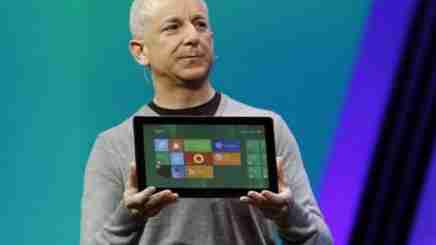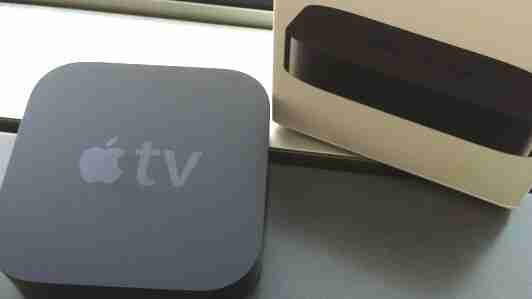Windows 8, Microsoft’s new operating system that is equally at home on desktop PCs and tablets may be in trouble before it’s even launched, according to a new report from Forrester Research.

Microsoft’s Shrinking Window For Tablets finds that the rapidly developing tablet market is leaving Microsoft behind. In Q1 of 2011, Forrester asked consumers what operating system they would like on a tablet, and 46% opted for Windows – the top choice (remember, this was before Windows 8’s tablet interface was even announced). In its latest survey for Q3, that figure had depleted to just 25%. iOS is now the top choice, with interest in Android growing.
Microsoft’s problem, as Forrester sees it, is that it’s already 18 months since the Apple iPad originally launched and Microsoft is now a ‘fifth-mover’ behind Android tablets, WebOS and the BlackBerry Playbook. The research firm adds that low consumer demand for Windows Phone 7 means that it’s “a lost opportunity to build consumer anticipation for Windows 8… It offers no launch pad for Windows 8.”
However, it’s not all bad news for Microsoft; Forrester sees Windows 8 tablets as appealing to hardware companies like Dell (which has already pledged its allegiance to the cause), Acer and Asus, Lenovo, Sony, Toshiba and HP. The theory here is that these firms are “chasing good money after bad” with Android tablets due to high prices, poor marketing and distribution, and fragmented product offerings which have hindered the market. The synergy between desktop and tablet machines running the same interface could also be appealing.
To compensate for its slow start and waning consumer demand, Forrester recommends that Microsoft emphasises productivity and gaming, both natural Windows strengths, push for lower-priced models (with Windows 8 tablets expected by retailers to cost at least $500, will anyone opt for one in the face of competition from the Kindle Fire?), and boost its marketing efforts.
If interest in Windows 8 tablets is declining, that’s clearly a problem for Microsoft. However, some of this report’s arguments bear scrutiny.
The early success of Amazon’s Kindle Fire shows that not every hit tablet needs to be a direct rival to the iPad – there can be room in the market for different options. Just as Amazon opted to turn its tablet into cloud-focused media consumption device, Microsoft could actually benefit from the tablets that have come before it.
With the iPad and its kind having popularised the idea of the tablet as a useful device to own, maybe the time’s right for a range of Windows 8 tablets that appeal to businesses and power users alike by bringing a bit more of desktop-grade experience to your hands on the go. Meanwhile, it seems like Windows Phone 7 device sales are on the up , meaning that the mobile OS may prove a useful springboard for tablets after all.
On the other hand, no official release date has been announced for Windows 8 yet, and we don’t even know if that will be the operating system’s final name. By the time it arrives, Microsoft might not be suffering as a ‘fifth mover’, it could be an eighth, ninth or tenth.
iOS 5.1 beta reveals next-gen Apple TV codename, hints at upcoming release
The much rumoured next-generation Apple TV has taken a step closer to reality after 9to5Mac unearthed what is believed to be the new product’s codename, J33.

The mention of the device in the latest iOS 5.1 developer beta confirms that a new Apple TV is indeed planned. Code names are, of course, not the final names given to Apple products, but it is a significant development nevertheless, because it usually indicates that the product is near release. However, it doesn’t reveal exactly what stage of development it is at.
The new firmware has already led to rumours of a dual-mode iPad 2 , and here is the mention of J33, which was originally spotted by ih8sn0w .
In the biography written by Walter Isaacson, Steve Jobs revealed his desire to build an integrated television set that “seamlessly synced with all of your devices and with iCloud”— which, given Apple’s focus on cloud services , could manifest in the form of the next Apple TV.
Apple has already started the rollout of cloud-related services like iTunes match to Apple TV users, stoking speculation about the possibility of a new device.
Aggressive MacBook Air pricing presents challenge for Ultrabooks
With the discontinuation of the low-end white MacBook and the agressive $999 pricing of the new MacBook Air, Apple has taken its most aggressive stance in the thin-and-light notebook category. This may pose some problems for manufacturers trying to produce competitive hardware using Intel’s Ultrabook specifications, reports Digitimes .

The Ultrabook specification was designed by Intel to move the notebook industry into the MacBook Air’s super-thin space. The specs call for the devices to adopt a non-replaceable battery, metal heat-dissapating chassis, solid state storage and soldered-in components in order to minimize size and weight. Thsi is very similiar to the way that MacBook Airs are constructed.
It’s also a significant departure from the modular design currently adopted by most manufacturers. This means that much of the manufacturing pipeline for Ultrabooks will have to use new methods, making them more expensive to produce than traditional laptops.
The reports from channel sources indicate that, unless Intel were to reduce the cost of its processors, which account for one third of the total cost of a potential Ultrabook, there is little chance that manufacturers like Asus or Lenovo will be able to offer Ultrabooks at or below the $999 price point that the MacBook Air currently sits at.
Apple has been pursuing a low cost version of its MacBook Air since it was introduced two years ago and the feature packed and bargain-priced versions of the Air that were announced late last month are the culmination of years worth of refinement and supply-chain sourcing.
The Ultrabook standard, by comparison, was only introduced at Computex earlier this year. Apple has a history of building a supply chain based on early investements in new manufacturing processes and highly favorable deals with suppliers that make it harder for its rivals to produce similar products at competitive price points.
If the Ultrabooks are to get off the ground, Intel may have to make some pricing concessions with its new Ivy Bridge processors, due up either later this year or in the first quarter of 2012. We probably won’t be seeing any Ultrabooks on the market until Q2, at which point Apple will most likely be nearing the release of its 4th generation MacBook Air.
If early Ultrabooks are unable to compete on price, its likely that sales will stagnate in the face of the rising popularity of the Air, which is now the best selling Mac . The real question is how long it will take for the supply chains and manufacturing processes of other makers to catch up to Apple’s beefy lead.
